仁爱九年级上unit4topic2导学案
Unit 4 Topic2 Section D(仁爱版九年级上册英语导学案)
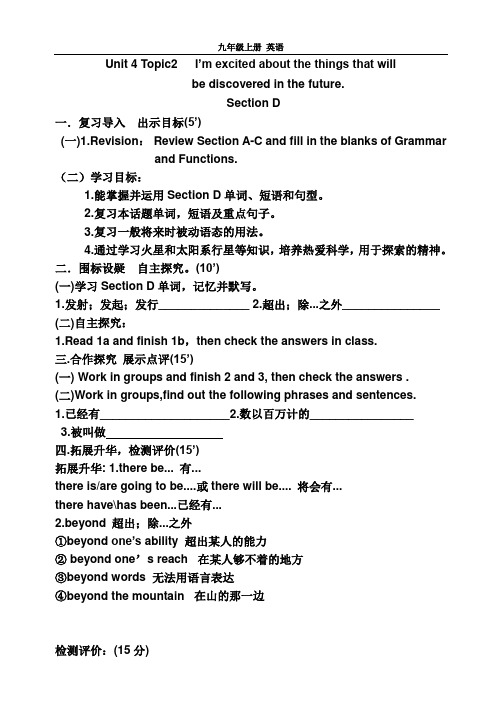
Unit 4 Topic2 I’m excited about the things that willbe discovered in the future.Section D一.复习导入出示目标(5’)(一)1.Revision: Review Section A-C and fill in the blanks of Grammarand Functions.(二)学习目标:1.能掌握并运用Section D单词、短语和句型。
2.复习本话题单词,短语及重点句子。
3.复习一般将来时被动语态的用法。
4.通过学习火星和太阳系行星等知识,培养热爱科学,用于探索的精神。
二.围标设疑自主探究。
(10’)(一)学习Section D单词,记忆并默写。
1.发射;发起;发行______________2.超出;除...之外_______________(二)自主探究:1.Read 1a and finish 1b,then check the answers in class.三.合作探究展示点评(15’)(一) Work in groups and finish 2 and 3, then check the answers .(二)Work in groups,find out the following phrases and sentences.1.已经有____________________2.数以百万计的________________3.被叫做四.拓展升华,检测评价(15’)拓展升华: 1.there be... 有...there is/are going to be....或there will be.... 将会有...there have\has been...已经有...2.beyond 超出;除...之外①beyond one’s ability 超出某人的能力② beyond one’s reach 在某人够不着的地方③beyond words 无法用语言表达④beyond the mountain 在山的那一边检测评价:(15分)每一个人都会畅想自己未来的生活,有目标才会有动力。
初中英语仁爱科普版九年级上 Unit 4 Topic 2 Section A学案(无答案)
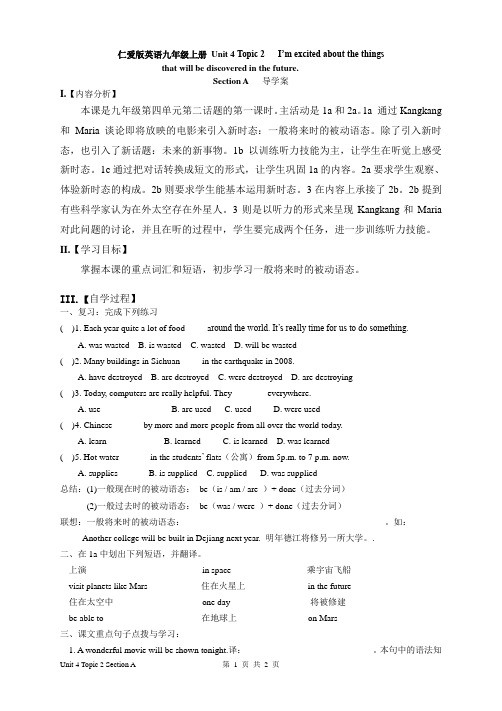
仁爱版英语九年级上册Unit 4 Topic 2 I’m excited about the thingsthat will be discovered in the future.Section A 导学案I.【内容分析】本课是九年级第四单元第二话题的第一课时。
主活动是1a和2a。
1a 通过Kangkang 和Maria 谈论即将放映的电影来引入新时态:一般将来时的被动语态。
除了引入新时态,也引入了新话题:未来的新事物。
1b以训练听力技能为主,让学生在听觉上感受新时态。
1c通过把对话转换成短文的形式,让学生巩固1a的内容。
2a要求学生观察、体验新时态的构成。
2b则要求学生能基本运用新时态。
3在内容上承接了2b。
2b提到有些科学家认为在外太空存在外星人。
3则是以听力的形式来呈现Kangkang和Maria 对此问题的讨论,并且在听的过程中,学生要完成两个任务,进一步训练听力技能。
II.【学习目标】掌握本课的重点词汇和短语,初步学习一般将来时的被动语态。
III.【自学过程】一、复习:完成下列练习( )1. Each year quite a lot of food ____ a round the world. It’s really time for us to do something.A. was wastedB. is wastedC. wastedD. will be wasted( )2. Many buildings in Sichuan ____ in the earthquake in 2008.A. have destroyedB. are destroyedC. were destroyedD. are destroying( )3. Today, computers are really helpful. They _______ everywhere.A. useB. are usedC. usedD. were used( )4. Chinese ______ by more and more people from all over the world today.A. learnB. learnedC. is learnedD. was learned( )5. Hot water ______ in the students’ flats(公寓)from 5p.m. to 7 p.m. now.A. suppliesB. is suppliedC. suppliedD. was supplied总结:(1)一般现在时的被动语态:be(is / am / are )+ done(过去分词)(2)一般过去时的被动语态:be(was / were )+ done(过去分词)联想:一般将来时的被动语态:_____________________________________________。
九年级英语上册Unit4 Topic2精品教案 整个话题39页 最新仁爱版
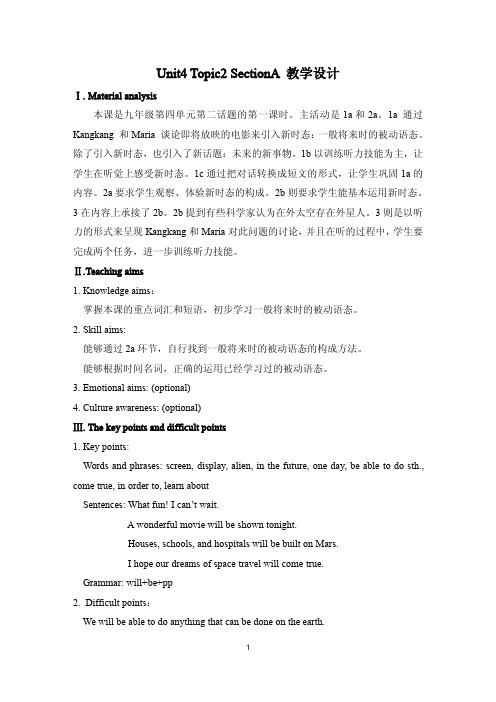
Unit4Topic2SectionA教学设计Ⅰ.Material analysis本课是九年级第四单元第二话题的第一课时。
主活动是1a和2a。
1a通过Kangkang和Maria谈论即将放映的电影来引入新时态:一般将来时的被动语态。
除了引入新时态,也引入了新话题:未来的新事物。
1b以训练听力技能为主,让学生在听觉上感受新时态。
1c通过把对话转换成短文的形式,让学生巩固1a的内容。
2a要求学生观察、体验新时态的构成。
2b则要求学生能基本运用新时态。
3在内容上承接了2b。
2b提到有些科学家认为在外太空存在外星人。
3则是以听力的形式来呈现Kangkang和Maria对此问题的讨论,并且在听的过程中,学生要完成两个任务,进一步训练听力技能。
Ⅱ.Teaching aims1.Knowledge aims:掌握本课的重点词汇和短语,初步学习一般将来时的被动语态。
2.Skill aims:能够通过2a环节,自行找到一般将来时的被动语态的构成方法。
能够根据时间名词,正确的运用已经学习过的被动语态。
3.Emotional aims:(optional)4.Culture awareness:(optional)Ⅲ.The key points and difficult points1.Key points:Words and phrases:screen,display,alien,in the future,one day,be able to do sth., come true,in order to,learn aboutSentences:What fun!I can’t wait.A wonderful movie will be shown tonight.Houses,schools,and hospitals will be built on Mars.I hope our dreams of space travel will come true.Grammar:will+be+pp2.Difficult points:We will be able to do anything that can be done on the earth.I won’t believe there are aliens until I see them with my own eyes.Ⅳ.Learning strategies能够通过2a的示范,领悟一般将来时的被动语态的构成,自主对新知识进行初步总结、归纳。
Unit4 Topic 2 Section A(仁爱版九年级上册英语导学案)

Unit 4 Topic 2I’m excited about the things that will be discovered in the future.Section A上课时间:_________一.复习导入出示目标(5’)学习目标:1.掌握Section A单词,短语及重点句子。
2.学习一般将来时被动语态的用法。
二.围标设疑自主探究。
(10’)(一)学习Section A单词,记忆并默写1.显示,显露_____________2. 屏幕;银幕_______________3.外星人;陌生的;外国的________4.外层空间_________________5.描述;形容;把……称为____________(二)自主探究:1.Listen to 1a and finish 1b.2. Read 1a by yourselves,find out the useful phrases and sentences.3.Read la again and finish 1c.4.Finish 2a and 2b.5. Listen and finish 3.三.合作探究展示点评(15’)(一) W ork in groups ,find out the following phrases and sentences.1.在太空___________________2.将能够做某事___________________3.在地球上________________ 4将来5.迫不及待做某事6..为了1)2)3)7.直到……才__________8.亲眼目睹___________=_________________四.拓展升华,检测评价(15’)拓展升华:一般将来时被动语态构成:be going to / will be +过去分词检测评价:(17分)得分:___________( )1.—Some flowers ______ in the garden tomorrow.--I’m sure it will be more beautiful.A. will plantB. are plantedC. were plantedD. will be planted( )2.-- What’s the movie E.T. ________?--Aliens. It’s very interesting.A. inB. aboutC. forD. on( )3.My sister hardly ever eats junk food _____ keep healthy.A. so thatB. in order toC. in order thatD. for( )4.—You will be famous _____ if you keep on working hard.--Thank you.A. some daysB. the dayC. a dayD. one day( )5.—Most housework ______ by the robots in the future.--I agree.A. will doB. will be doneC. is doneD. was done( )6.--Which is the longest river____________?--The River Nile.A.on the earthB.in the earthC.on an earthD.in an earth ( )7.--There is going to be a wonderful football match on TV tonight.--How exciting!_____________A.I can’t stand it.B.I’m afraid notC.I can’t wait.D.I’m not sure补全对话:A:A wonderful movie will be shown tonight.1_____________________ B.Great!2.__________________________A.It’s about life in space.B.3._________________________________A:Yes.All the people travel by spaceship in the movie and they can visit plants like Mars.B:Really?4.________________________________________________ A:Yes. I think we will live in space one day.Houses will be built on Mars. We will be able to do anything on the earth.A:5._____________________ I can’t wait it.。
仁爱版九年级上册英语学案:Unit 4 topic 2 Section D
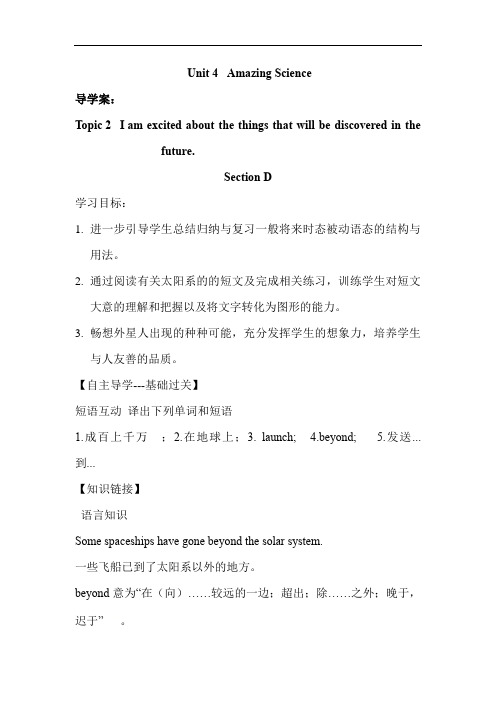
Unit4Amazing Science导学案:Topic2 I am excited about the things that will be discovered in the future.Section D学习目标:1.进一步引导学生总结归纳与复习一般将来时态被动语态的结构与用法。
2.通过阅读有关太阳系的的短文及完成相关练习,训练学生对短文大意的理解和把握以及将文字转化为图形的能力。
3.畅想外星人出现的种种可能,充分发挥学生的想象力,培养学生与人友善的品质。
【自主导学---基础过关】短语互动译出下列单词和短语1.成百上千万;2.在地球上;unch;4.beyond;5.发送...到...【知识链接】语言知识Some spaceships have gone beyond the solar system.一些飞船已到了太阳系以外的地方。
beyond意为“在(向)……较远的一边;超出;除……之外;晚于,迟于”。
如:Our success was far beyond what we thought.我们的成功远远超出我们的预想。
【当堂检测】1.翻译下列日常交际用语:Sound great!What is it about?What fun!I can’t wait.You think man can live in space one day?I Think so.I hope I can live there one day.2.阅读1a并完成下列句子______________________is the only one place where there ar e lives.The earth and_______________other planets all________________ ___around the sun.And_______________andits______________ are called solar system.Although scientists have____________________many spacesh ips to explore the space.__________ , they discovered____________in space.。
仁爱版九年级上册英语学案:Unit 4 topic 2 Section A
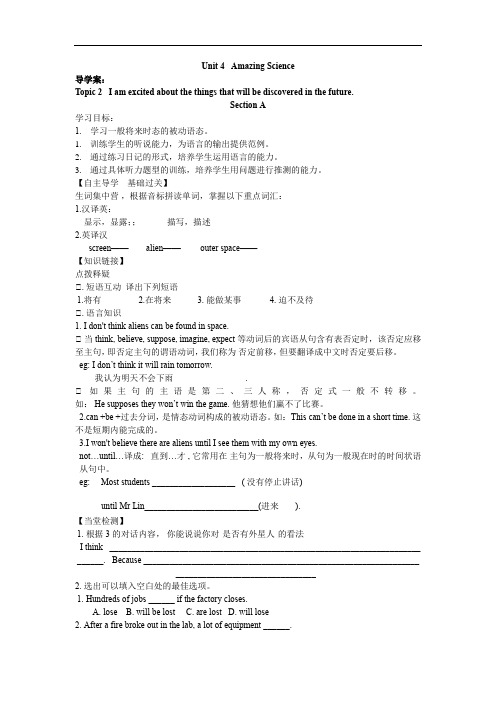
Unit4Amazing Science导学案:Topic2 I am excited about the things that will be discovered in the future.Section A学习目标:1. 学习一般将来时态的被动语态。
1.训练学生的听说能力,为语言的输出提供范例。
2.通过练习日记的形式,培养学生运用语言的能力。
3.通过具体听力题型的训练,培养学生用问题进行推测的能力。
【自主导学---基础过关】生词集中营,根据音标拼读单词,掌握以下重点词汇:1.汉译英:显示,显露;;描写,描述2.英译汉screen——alien——outer space——【知识链接】点拨释疑Ⅰ.短语互动译出下列短语1.将有2.在将来3.能做某事4.迫不及待Ⅰ.语言知识1.I don't think aliens can be found in space.Ⅰ当think,believe,suppose,imagine,expect等动词后的宾语从句含有表否定时,该否定应移至主句,即否定主句的谓语动词,我们称为否定前移,但要翻译成中文时否定要后移。
eg:I don’t think it will rain tomorrow.我认为明天不会下雨.Ⅰ如果主句的主语是第二、三人称,否定式一般不转移。
如:He supposes they won’t win the game.他猜想他们赢不了比赛。
2.can+be+过去分词,是情态动词构成的被动语态。
如:This can’t be done in a short time.这不是短期内能完成的。
3.I won't believe there are aliens until I see them with my own eyes.not…until…译成:直到…才,它常用在主句为一般将来时,从句为一般现在时的时间状语从句中。
eg:Most students___________________(没有停止讲话)until Mr Lin__________________________(进来).【当堂检测】1.根据3的对话内容,你能说说你对-是否有外星人-的看法I think_______________________________________________________________________ ______.Because_______________________________________________________________________________________________2.选出可以填入空白处的最佳选项。
14年新版仁爱英语九年级上册Unit4Topic2SectionD第51课时导学案
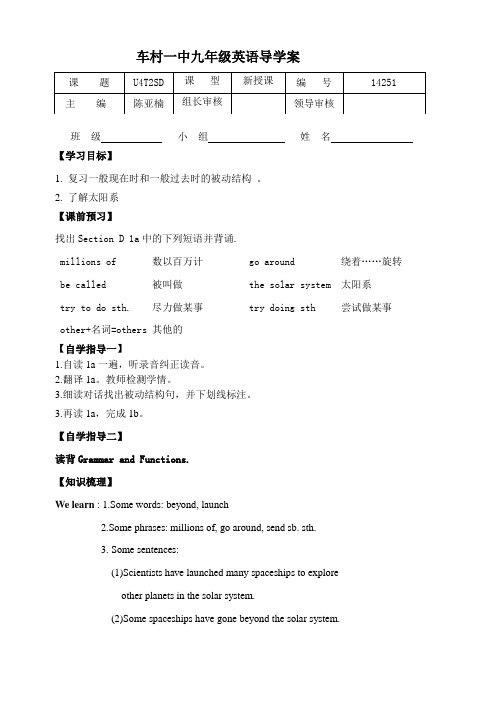
车村一中九年级英语导学案班级小组姓名【学习目标】1. 复习一般现在时和一般过去时的被动结构。
2.了解太阳系【课前预习】找出Section D 1a中的下列短语并背诵.millions of 数以百万计 go around 绕着……旋转be called 被叫做 the solar system 太阳系try to do sth. 尽力做某事 try doing sth 尝试做某事other+名词=others 其他的【自学指导一】1.自读1a一遍,听录音纠正读音。
2.翻译1a。
教师检测学情。
3.细读对话找出被动结构句,并下划线标注。
3.再读1a,完成1b。
【自学指导二】读背Grammar and Functions.【知识梳理】We learn : 1.Some words: beyond, launch2.Some phrases: millions of, go around, send sb. sth.3. Some sentences:(1)Scientists have launched many spaceships to exploreother planets in the solar system.(2)Some spaceships have gone beyond the solar system.We can : 1.Talk about more about outer space.2.Summarize the passive voice of the simple future tense.【当堂检测】1.You must read the whole text carefully, or some useful information ______.A. can findB. can`t be foundC. can`t findD. can be found2. Shenzhou VI , China`s second manned spaceship, went around the earth ______about 343 kilometers.A. at a distance ofB. at a distanceC .from a distance D. in the distance3. How time flies .It ______3 years since I ______to Kunming last time .A. has been ; have comeB. has been ;cameC. is ;has comeD. takes, came4.My hometown is a nice place .And it is ______your hometown.A. two-thirds as big as B .two-third as big asC .two-thirds as small asD .two-third as small as【课后反思】。
仁爱版英语九年级上册Unit4 Topic2 SectionD 精品学案
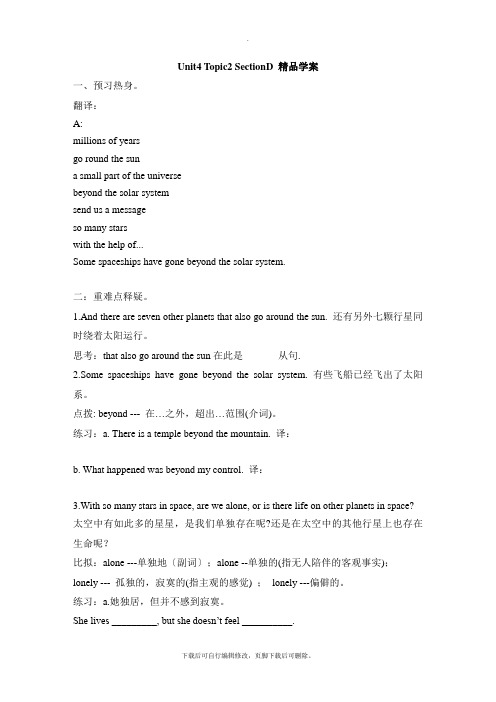
Unit4 Topic2 SectionD 精品学案一、预习热身。
翻译:A:millions of years________________go round the sun______________________a small part of the universe______________beyond the solar system_______________send us a message_____________so many stars________________with the help of...__________________Some spaceships have gone beyond the solar system.____________________________________二:重难点释疑。
1.And there are seven other planets that also go around the sun. 还有另外七颗行星同时绕着太阳运行。
思考:that also go around the sun在此是_______从句.2.Some spaceships have gone beyond the solar system. 有些飞船已经飞出了太阳系。
点拨: beyond --- 在…之外,超出…范围(介词)。
练习:a. There is a temple beyond the mountain. 译:___________________________________b. What happened was beyond my control. 译:___________________________________3.With so many stars in space, are we alone, or is there life on other planets in space? 太空中有如此多的星星,是我们单独存在呢?还是在太空中的其他行星上也存在生命呢?比拟:alone ---单独地〔副词〕;alone --单独的(指无人陪伴的客观事实);lonely --- 孤独的,寂寞的(指主观的感觉) ;lonely ---偏僻的。
【仁爱版】九年级英语上册导学案 Unit 4 topic 2
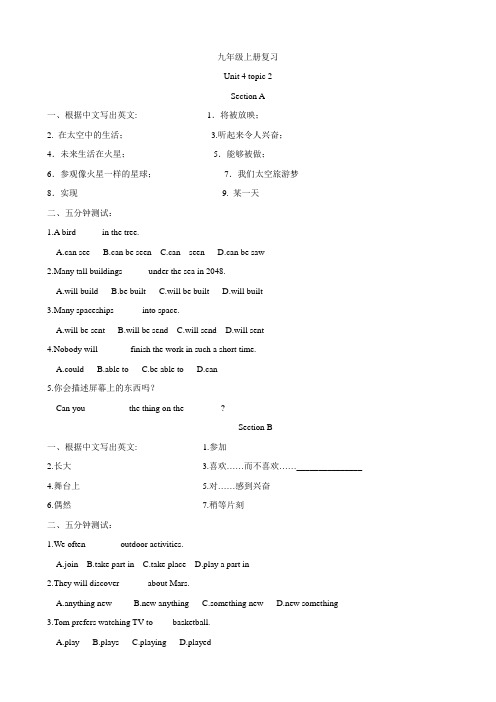
九年级上册复习Unit 4 topic 2Section A一、根据中文写出英文: 1.将被放映;____________________________2. 在太空中的生活;______________3.听起来令人兴奋;_______________________ 4.未来生活在火星;________________ 5.能够被做;______________________________ 6.参观像火星一样的星球;_______________ 7.我们太空旅游梦____________________ 8.实现___________________________ 9. 某一天_____________________________二、五分钟测试:1.A bird _____ in the tree.A.can seeB.can be seenC.can seenD.can be saw2.Many tall buildings _____ under the sea in 2048.A.will buildB.be builtC.will be builtD.will built3.Many spaceships ______into space.A.will be sentB.will be sendC.will sendD.will sent4.Nobody will _______finish the work in such a short time.A.couldB.able toC.be able toD.can5.你会描述屏幕上的东西吗?Can you _________ the thing on the ________?Section B一、根据中文写出英文: 1.参加_______________________________2.长大_________________________3.喜欢……而不喜欢……_______________4.舞台上________________________5.对……感到兴奋_______________________6.偶然_________________________7.稍等片刻二、五分钟测试:1.We often _______ outdoor activities.A.joinB.take part inC.take placeD.play a part in2.They will discover______ about Mars.A.anything newB.new anythingC.something newD.new something3.Tom prefers watching TV to ____basketball.A.playB.playsC.playingD.played4.More and more trees __ in our city in the next few years.A.will plantB.will be plantedC.plantD.are planted5.人们已认识到保护环境的重要性。
Unit4 Topic 2 Section C(仁爱版九年级上册英语导学案)
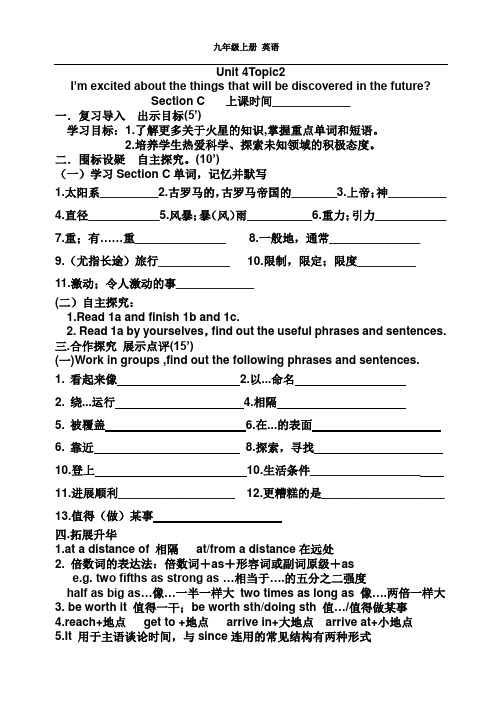
Unit 4Topic2I’m excited about the things that will be discovered in the future?Section C上课时间____________一.复习导入出示目标(5’)学习目标:1.了解更多关于火星的知识,掌握重点单词和短语。
2.培养学生热爱科学、探索未知领域的积极态度。
二.围标设疑自主探究。
(10’)(一)学习Section C单词,记忆并默写1.太阳系_________2.古罗马的,古罗马帝国的_______3.上帝;神_________4.直径___________5.风暴;暴(风)雨__________6.重力;引力___________7.重;有……重______________8.一般地,通常______________9.(尤指长途)旅行___________ 10.限制,限定;限度_________11.激动;令人激动的事____________(二)自主探究:1.Read 1a and finish 1b and 1c.2. Read 1a by yourselves,find out the useful phrases and sentences.三.合作探究展示点评(15’)(一) W ork in groups ,find out the following phrases and sentences.1. 看起来像2.以...命名2. 绕...运行 4.相隔5. 被覆盖6.在...的表面6. 靠近8.探索,寻找10.登上10.生活条件_________________11.进展顺利__________________ 12.更糟糕的是___________________13.值得(做)某事四.拓展升华1.at a distance of 相隔at/from a distance在远处2. 倍数词的表达法:倍数词+as+形容词或副词原级+ase.g. two fifths as strong as …相当于….的五分之二强度half as big as…像…一半一样大two times as long as 像….两倍一样大3. be worth it 值得一干;be worth sth/doing sth 值…/值得做某事4.reach+地点get to +地点arrive in+大地点arrive at+小地点5.It 用于主语谈论时间,与since连用的常见结构有两种形式(1)It has been +一段时间+since+从句Eg: It has been a long time since they left.(2) It is +一段时间+since从句eg: It’s a long time since they left.6.another+数字+复数名词=数字+more+复数名词另外的……another seven days=seven more days7.It takes/took sb time/money to do sth 花费某人多少时间/金钱做某事sb spend time/money on sth 某人花费时间/金钱在某物上sb spend time/money (in)doing sth 某人花费时间/金钱做某事sth cost sb money 某物花费了某人多少钱sb pay for sth 某人为某物付款检测评价(12分):得分:___________Future and TodayIt is well known that everyone has his own dream as well as his own future. 11 I have to say that future is now. That is to say we must treasure every minute now. If we want to have a bright future, we should know how important time is and use it well.There is an old English saying: “Gain time, gain life.”12 Time is something that we can’t see or touch, but we can feel it passing by. Time is always with us. When we are at table, time passes; when we play, time goes by unnoticeably. We always say “Time is money”, but time is even more precious(珍贵的)than money, because when money is spent , we can earn it back.13 So, some of us even say time is priceless(无价的).We should always remember: future is now. For us students, we should try our best to work hard in order to create a great future of our own. 14 We should do everything before us as soon as possible. And never put off what can be done today till tomorrow.As we all know , “Time and tide wait for no man.” 15 So from now on, work hard. Tomorrow will be better, and your future will be brighter. Remember: “No pains, no gains.” Today’s hard work is the cause of tomorrow’s harvest.A. But if time is gone away, it will never return.B. If you waste today, you will regret tomorrow.C. But do you know what future really is ?D. We should make the best use of every hour and be the master of today.E. Then what’s time?11. 12. 13. 14. 15.。
仁爱版英语九年级上册9A_Unit4_Topic2_SectionD_教学设计
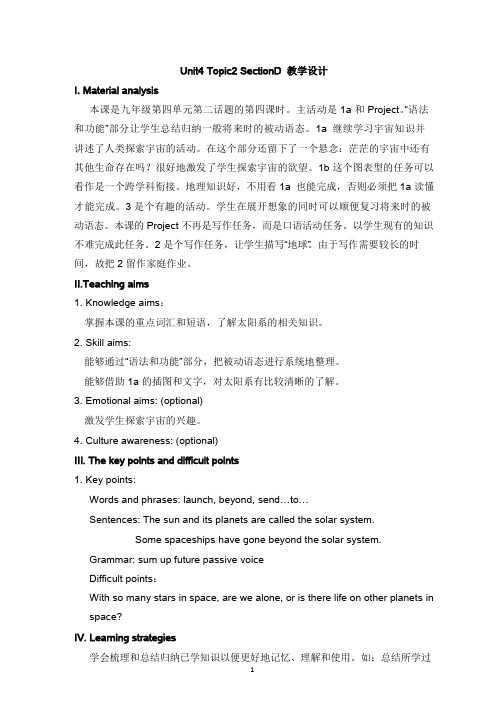
Unit4 Topic2 SectionD 教学设计Ⅰ. Material analysis本课是九年级第四单元第二话题的第四课时。
主活动是1a 和Project。
“语法和功能”部分让学生总结归纳一般将来时的被动语态。
1a 继续学习宇宙知识并讲述了人类探索宇宙的活动。
在这个部分还留下了一个悬念:茫茫的宇宙中还有其他生命存在吗?很好地激发了学生探索宇宙的欲望。
1b 这个图表型的任务可以看作是一个跨学科衔接。
地理知识好,不用看1a 也能完成,否则必须把1a 读懂才能完成。
3 是个有趣的活动。
学生在展开想象的同时可以顺便复习将来时的被动语态。
本课的Project 不再是写作任务,而是口语活动任务。
以学生现有的知识不难完成此任务。
2 是个写作任务,让学生描写“地球”。
由于写作需要较长的时间,故把2 留作家庭作业。
Ⅱ.Teaching aims1. Knowledge aims:掌握本课的重点词汇和短语,了解太阳系的相关知识。
2. Skill aims:能够通过“语法和功能”部分,把被动语态进行系统地整理。
能够借助1a 的插图和文字,对太阳系有比较清晰的了解。
3. Emotional aims: (optional)激发学生探索宇宙的兴趣。
4. Culture awareness: (optional)Ⅲ. The key points and difficult points1. Key points:Words and phrases: launch, beyond, send…to…Sentences: The sun and its planets are called the solar system.Some spaceships have gone beyond the solar system.Grammar: sum up future passive voiceDifficult points:With so many stars in space, are we alone, or is there life on other planets in space?Ⅳ. Learning strategies学会梳理和总结归纳已学知识以便更好地记忆、理解和使用。
仁爱版英语九年级上册Unit4 Topic2 SectionC 精品学案

Unit4 Topic2 SectionC 精品学案一、预习热身。
翻译:A:be named after Mars_____________________at a distance of...______________________53% as wide as...____________________two-fifths as strong as...____________________be closest to each other____________________search for more information_________________B:On the surface of Mars__________________weight only 36 kilos____________________the Roman god of war____C:Its diameter is 53%as wide as that of the earth.._______________________________________It has been two days since we landed on Mars._________________________________________二、重难点释疑。
1.Its diameter is 53%as wide as that of the earth..它的直径是地球直径的53%。
点拨:as﹢形容词/副词原级﹢as ﹢名词像…一样… 。
思考:句中that指代______________, 如果前面的名词是复数,用_________指代。
练习:a.我们学校像花园一样美。
Our school is _______ _____________ ______ a park.b. Tom和Mike跑得一样快。
Tom ________ _______ _________ ______ Mike.c.城市的楼比农村的高。
仁爱版九年级上册英语Unit4Topic2(荷塘中学)
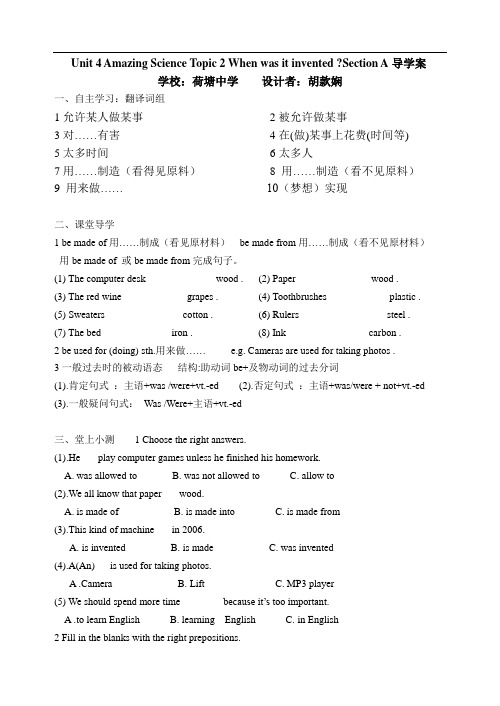
Unit 4 Amazing Science Topic 2 When was it invented ?Section A导学案学校:荷塘中学设计者:胡款娴一、自主学习:翻译词组1允许某人做某事2被允许做某事3对……有害4在(做)某事上花费(时间等)5太多时间6太多人7用……制造(看得见原料)8 用……制造(看不见原料)9 用来做…… 10(梦想)实现二、课堂导学1 be made of用……制成(看见原材料)be made from用……制成(看不见原材料)用be made of 或be made from完成句子。
(1) The computer desk _____________ wood . (2) Paper ______________ wood . (3) The red wine ____________ grapes . (4) Toothbrushes____________ plastic .(5) Sweaters_______________ cotton . (6) Rulers_________________ steel . (7) The bed _____________ iron . (8) Ink________________ carbon .2 be used for (doing) sth.用来做…… e.g. Cameras are used for taking photos .3一般过去时的被动语态结构:助动词be+及物动词的过去分词(1).肯定句式:主语+was /were+vt.-ed (2).否定句式:主语+was/were + not+vt.-ed (3).一般疑问句式:Was /Were+主语+vt.-ed三、堂上小测 1 Choose the right answers.(1).He ___play computer games unless he finished his homework.A. was allowed toB. was not allowed toC. allow to(2).We all know that paper ___wood.A. is made ofB. is made intoC. is made from(3).This kind of machine ___in 2006.A. is inventedB. is madeC. was invented(4).A(An)___is used for taking photos.A .Camera B. Lift C. MP3 player(5) We should spend more time ________because it’s too important.A .to learn English B. learning English C. in English2 Fill in the blanks with the right prepositions.(6).The desk is made _____ wood.(7). That kind of machine is made _____Japan.(8).This delicious cake was made ___my mother.(9).Glasses is made ___ glass.(10).Our group is made up ___ four students.四、课后作业1 请根据所学知识,发挥自己的创意描写电视机。
仁爱英语九年级Unit4 Topic 2学案教案
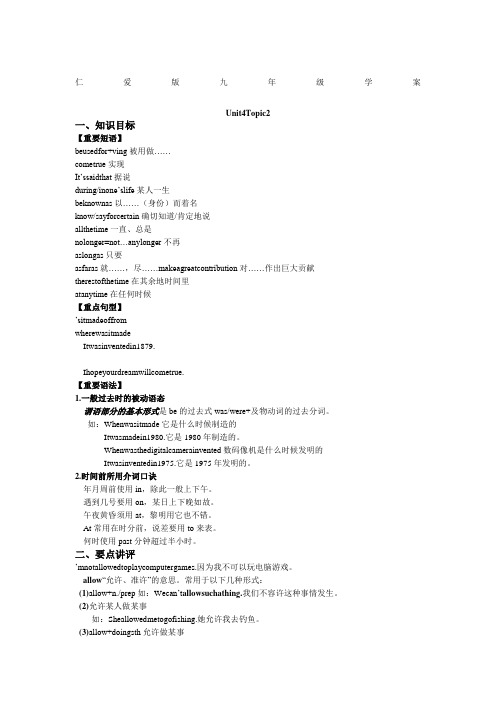
仁爱版九年级学案Unit4Topic2一、知识目标【重要短语】beusedfor+ving被用做……cometrue实现It’ssaidthat据说during/inone’slife某人一生beknownas以……(身份)而着名know/sayforcertain确切知道/肯定地说allthetime一直、总是nolonger=not…anylonger不再aslongas只要asfaras就……,尽……makeagreatcontribution对……作出巨大贡献therestofthetime在其余地时间里atanytime在任何时候【重点句型】’sitmadeoffromwherewasitmadeItwasinventedin1879.Ihopeyourdreamwillcometrue.【重要语法】1.一般过去时的被动语态谓语部分的基本形式是be的过去式was/were+及物动词的过去分词。
如:Whenwasitmade它是什么时候制造的Itwasmadein1980.它是1980年制造的。
Whenwasthedigitalcamerainvented数码像机是什么时候发明的Itwasinventedin1975.它是1975年发明的。
2.时间前所用介词口诀年月周前使用in,除此一般上下午。
遇到几号要用on,某日上下晚如故。
午夜黄昏须用at,黎明用它也不错。
At常用在时分前,说差要用to来表。
何时使用past分钟超过半小时。
二、要点讲评’mnotallowedtoplaycomputergames.因为我不可以玩电脑游戏。
allow“允许、准许”的意思。
常用于以下几种形式:(1)allow+n./prep如:We can’t allowsuchathing.我们不容许这种事情发生。
(2)允许某人做某事如:Sheallowedmetogofishing.她允许我去钓鱼。
(3)allow+doingsth允许做某事如:Wedon’t allowsmokinginthereading-room.我们不允许在阅览室吸烟。
2014九年级上仁爱英语Unit4_Topic2全导学案
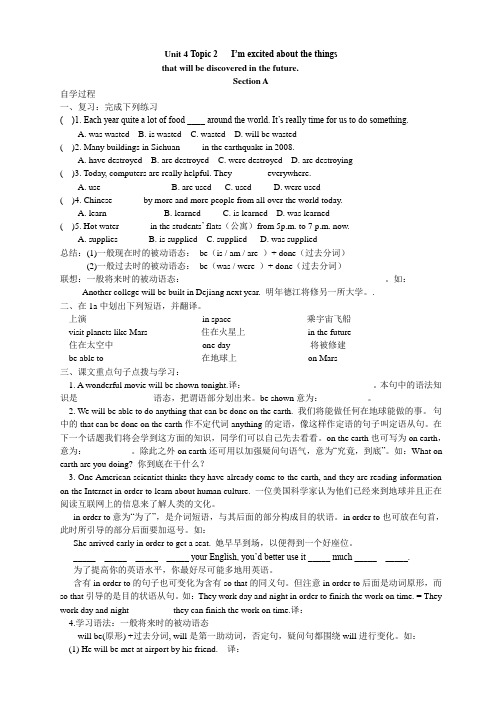
Unit 4 Topic 2 I’m excited about the thingsthat will be discovered in the future.Section A自学过程一、复习:完成下列练习( )1. Each year quite a lot of food ____ around the world. It’s really time for us to do something.A. was wastedB. is wastedC. wastedD. will be wasted( )2. Many buildings in Sichuan ____ in the earthquake in 2008.A. have destroyedB. are destroyedC. were destroyedD. are destroying( )3. Today, computers are really helpful. They _______ everywhere.A. useB. are usedC. usedD. were used( )4. Chinese ______ by more and more people from all over the world today.A. learnB. learnedC. is learnedD. was learned( )5. Hot water ______ in the students’ flats(公寓)from 5p.m. to 7 p.m. now.A. suppliesB. is suppliedC. suppliedD. was supplied总结:(1)一般现在时的被动语态:be(is / am / are )+ done(过去分词)(2)一般过去时的被动语态:be(was / were )+ done(过去分词)联想:一般将来时的被动语态:_____________________________________________。
- 1、下载文档前请自行甄别文档内容的完整性,平台不提供额外的编辑、内容补充、找答案等附加服务。
- 2、"仅部分预览"的文档,不可在线预览部分如存在完整性等问题,可反馈申请退款(可完整预览的文档不适用该条件!)。
- 3、如文档侵犯您的权益,请联系客服反馈,我们会尽快为您处理(人工客服工作时间:9:00-18:30)。
仁爱九年级英语上Unit4Topic2SectionA导学案设计人:耿艳华教学目标:利用新单词和短语谈论外星人教学重点:能够使用合理的句型表达可能和不可能教学难点:被动语态教学过程一. 读1a,完成1b二. 在文中找到并划出下面的短语1.这周六晚上_______________________________2.太空生活_____________3.生活在火星___________4.生活在太空___________________________________5.乘飞船旅行_______________6.在地球____________7.将会有______________8.将能够…_______________9.真有意思!___________10.(梦想)实现_____________ 11.为了了解人类文化_________________________12.我亲眼见到他们___________________________13.观看这样的电影___________________________14.科学研究__________________ 15.造纸___________16.在别的行星________________________________17.make sentences_______________三. 在文中划出下面的句子并分析1.We will be able to do anything that can be done on earth. 译:___________________________________________ 思考:that can be done on earth是______从句,修饰先行词__________点拨:can be done --- 能够/可以被做(带有情态动词的被动语态)练习:a.这些树明天必须被栽种。
These trees _______ ______ _________ tomorrow.b.李明可能被选为我们班的班长。
Li Ming ________ ______ ________ as the __________ of our class.c.下课后应该擦黑板。
The blackboard ________ _______ _________ after class.2. They are reading information on the Internet in order to learn about human culture.译:_______________________________________________________________________点拨:in order to (do) --- 为了… (后接目的状语),否定形式--- in order not to (do)…链接:so that --- 为了… (后接目的状语从句)练习:1.过去为了赚钱他们什么都肯做。
They did anything _____ ________ ____ __________ __________ in the past.2.为了通过考试,他每天学习十多个小时。
___ _______ _____ ____ fail the exam, he studied _____ _____ _____ ____ _______ every day.3.为了能赶上早班车今天早上他起床很早。
He ______ ____ early _____ _______ he _______ _________ the early bus this morning.4.为了提高口语他去年去了英国。
He went to England last year ___ ______ ____ _________her_______English.3.I don’t think aliens can be found in space. 译:______________________________________________________点拨:主语(第一人称)+think/suppose/believe/imagine/expect,后面宾语从句中的否定词not要前移到主句,即_____ 注意:这种含有否定前移复合句的反意疑问句部分要与从句一致练习:a.I expect they can make progress in English.(变否定句) ____________________________________________b.我相信他不会回来, 不是吗?I _______ __________he ________ ________ back, ________ _________?c.我认为明天不会下雨,是不是?I ________ ________ it _______ _______ tomorrow, ________ _________?4.I won’t believe there are aliens until I see them with my own eyes. 译:_____________________________________ 点拨: not…until… --- 直到…才…(until引导了时间状语从句),从句中要遵循---主将从现的原则对比:…until… 和not…until…分析:a.They kept waiting for her until she came back. 译:___________________________________________b.They didn’t leave until she came back. 译:___________________________________________总结:until…前面主句的谓语动词是_______________; not…until…前面主句的谓语动词是_______________练习:1.昨天晚上直到完成作业我才睡觉。
I _______ go to bed _______ I _________ my homework last night.2.明天我会一直等到你回来。
I _______ ________ ________ you ________ you ________ back tomorrow.1. Look! The old man is w______ the flowers in the garden.2. Scientists are continuing the r_____ on the moon.3. Did many women a____ her beauty?4. The s____ did a lot of harm to people.5. If you drive carefully, there is no r_____ of traffic accident.【课后巩固】I. 选用所给单词并用其正确形式填空1. Food, clothing and shelter are all _____ necessities of life.2. It isn’t _____ to visit a friend at this time.3. Astronauts will live and do _____ work in it.4. He saved my life at the ______ of being hurt.5. I would rather live in France for the good _________.6. The students are ______ the trees.7. There was a bad _____ last week.8. The post office is _____ the bridge.9. The ______ from our house is very beautiful.10. I ____ him for his courage.II. 完成下列句子语态的变化1. Your computer can’t be repaired any more.__________________________________________.2. You must finish all the work before tomorrow afternoon._________________________________________.3. He may make this model plane.__________________________________________.4. Need he eat up all the cakes?__________________________________________5. The thief can be caught in three days by the police.___________________________________________.仁爱九年级英语上Unit4Topic2Section B导学案教学目标:利用新单词和短语谈论火星教学重点:能够使用合理的句型表达可能和不可能教学难点:被动语态教学过程一. 读1a, 完成1b二.在文中找到并划出下面的短语1.参加太空飞行_________________________________2.发现新的事情_________________________________3.掌握一些基本电脑技术_________________________4.在舞台上表演芭蕾_____________________________5.喜欢科学胜过舞蹈_____________________________6.将被揭秘/发现________________________________7.使我们的梦想实现_____________________________8.the introductions to the movies____________________9.list more science fiction movies___________________10.以…为基础__________ 11.决定证明…___________12.时光穿越_______________ 13.迷路______________14.为了检测他的想法____________________________15.一群外星人__________________________________16.一个十岁的男孩______________________________17.开始一段与众不同的友谊____________________________________________18.月球之旅____________________________________19.go wrong___________ 20….的开端______________21.地球末日____________________________________22.对…感兴趣__________________________________三.在文中划出下面的句子并分析1.I prefer science to dance.译:_______________________点拨:prefer --- 更喜欢…= like…better总结:a.prefer sth.to sth. 和…比较起来更喜欢…b. prefer doing sth. to doing sth. --- 和做某事比起来更喜欢做某事c. prefer to do sth --- 更喜欢做某事(一时性的)d. prefer doing sth. --- 更喜欢做某事(长久性的)练习:a.和重庆比起来我更喜欢厦门。
